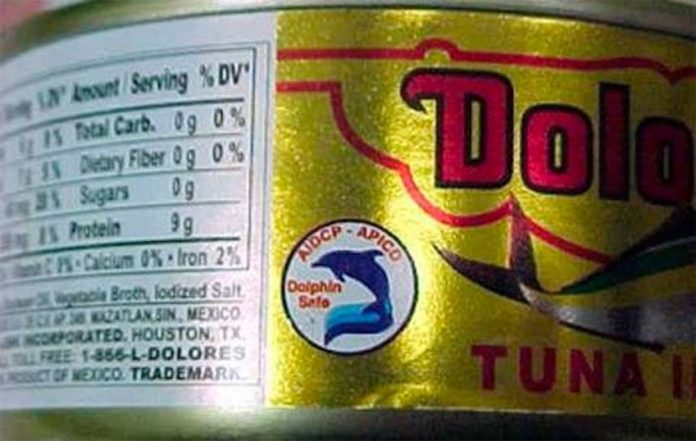Mexico lost a 10-year legal battle with the United States over “dolphin safe” tuna labeling yesterday when World Trade Organization (WTO) appeals judges dismissed its argument that U.S. labeling rules violated WTO rules.
Mexico claimed that the U.S. rules unfairly penalized its fishing industry because most tuna caught in Mexican waters is not certified as “dolphin safe” even though dolphin deaths have been reduced to minimal levels.
The United States’ demands for paperwork reflected discrimination against the Mexican tuna industry, it said, pointing out that the same industry in other parts of the world didn’t face the same strict tests.
The United States has refused to grant a “dolphin safe” label to tuna caught by chasing and encircling dolphins with a purse seine net that is used to catch tuna swimming beneath them. That method is used almost exclusively by Mexico’s tuna fleet in the Pacific Ocean.
Because most Mexican-caught tuna is not considered “dolphin safe,” Mexico has largely been locked out of the United States lucrative canned tuna market.
The WTO ruled yesterday that “setting on” dolphins with a purse seine net was likely to kill or injure them, even if there was no clear evidence of such deaths or injuries and thus the United States was within its rights to refuse to grant a “dolphin safe” label to tuna caught in that way.
Mexico won two previous rounds of the long legal battle, which forced the United States to modify its labeling rules in 2013 and again in 2016.
In April last year, Mexico won the right to impose US $163 million in annual trade sanctions on its northern neighbor if the WTO ruled that U.S. labeling rules still didn’t comply with WTO rules.
Mexico had planned to impose duties on high-fructose corn syrup imports but the United States sought a review of the ruling and six months later the WTO said that its labeling laws were WTO-compliant.
Mexico appealed that ruling, which resulted in yesterday’s decision.
In a statement, the Secretariat of the Economy (SE) said that the latest WTO ruling “doesn’t recognize the high standards of sustainable practices in the Mexican [tuna] industry.”
The SE said “the government of Mexico and the [fishing] industry have played an important role in the protection of dolphins against the adverse effects of tuna fishing,” adding “thanks to Mexico’s efforts, the United States modified its rules on two occasions.”
It also said that “the [fishing] method used by the Mexican tuna fleet is regulated by the International Dolphin Conservation Program Act, [which is] recognized by the Food and Agriculture Organization of the United Nations as being the most sustainable program.”
In addition, the Mexican tuna industry’s fishing method “has been certified by the Marine Stewardship Council as . . . sustainable in maintaining the target species and minimizing the impact on the environment,” the statement said.
The SE said that “Mexico hopes that beyond [yesterday’s] ruling, the United States recognizes the effect that fishing methods used by its fleet and that of other countries have on the marine ecosystem.”
Foreign trade undersecretary Luz María de la Mora said in a radio interview yesterday that Mexico will now focus on growing its tuna exports to other markets while attempting to enter into dialogue with the United States on the labeling issue.
She also defended the Mexican tuna industry’s use of seine nets and said that abandoning that fishing method was unlikely.
“The industry will have to decide if it’s convenient to modify its fishing method, but I don’t think that will happen because it’s a sustainable, responsible method,” de la Mora said.
Source: El Economista (sp), Reuters (sp)
